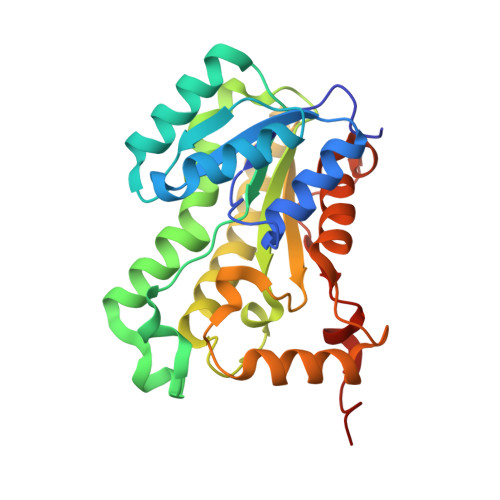Indole Naphthyridinones as Inhibitors of Bacterial Enoyl-ACP Reductases FabI and FabK
Seefeld, M.A., Miller, W.H., Newlander, K.A., Burgess, W.J., DeWolf Jr., W.E., Elkins, P.A., Head, M.S., Jakas, D.R., Janson, C.A., Keller, P.M., Manley, P.J., Moore, T.D., Payne, D.J., Pearson, S., Polizzi, B.J., Qiu, X., Rittenhouse, S.F., Uzinskas, I.N., Wallis, N.G., Huffman, W.F.(2003) J Med Chem 46: 1627-1635
- PubMed: 12699381
- DOI: https://doi.org/10.1021/jm0204035
- Primary Citation of Related Structures:
1MFP - PubMed Abstract:
Bacterial enoyl-ACP reductase (FabI) is responsible for catalyzing the final step of bacterial fatty acid biosynthesis and is an attractive target for the development of novel antibacterial agents. Previously we reported the development of FabI inhibitor 4 with narrow spectrum antimicrobial activity and in vivo efficacy against Staphylococcus aureus via intraperitoneal (ip) administration. Through iterative medicinal chemistry aided by X-ray crystal structure analysis, a new series of inhibitors has been developed with greatly increased potency against FabI-containing organisms. Several of these new inhibitors have potent antibacterial activity against multidrug resistant strains of S. aureus, and compound 30 demonstrates exceptional oral (po) in vivo efficacy in a S. aureus infection model in rats. While optimizing FabI inhibitory activity, compounds 29 and 30 were identified as having low micromolar FabK inhibitory activity, thereby increasing the antimicrobial spectrum of these compounds to include the FabK-containing pathogens Streptococcus pneumoniae and Enterococcus faecalis. The results described herein support the hypothesis that bacterial enoyl-ACP reductases are valid targets for antibacterial agents.
Organizational Affiliation:
GlaxoSmithKline Pharmaceuticals, 1250 South Collegeville Road, P.O. Box 5089, Collegeville, Pennsylvania 19426, USA. [email protected]

















